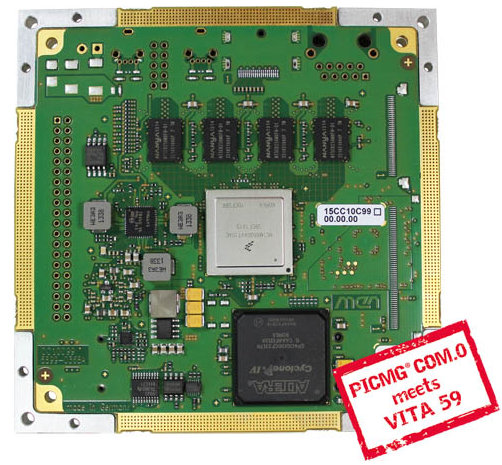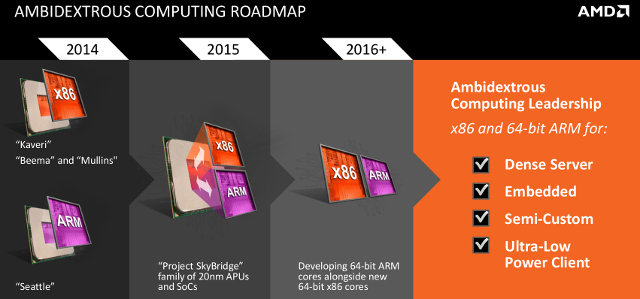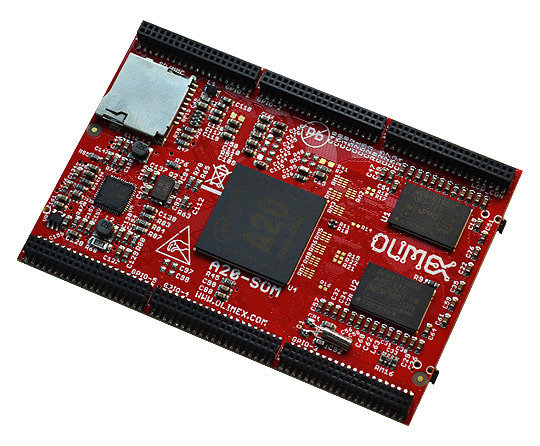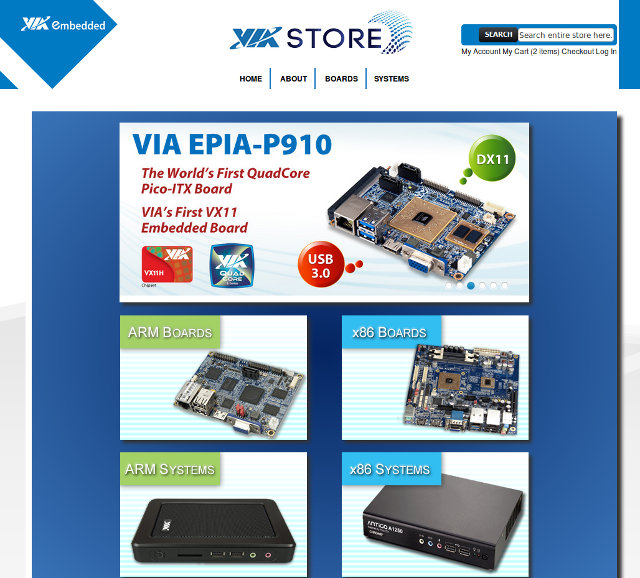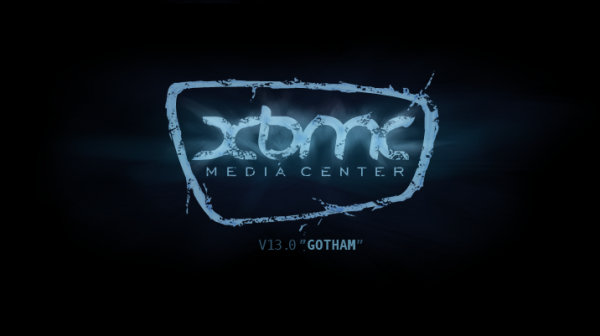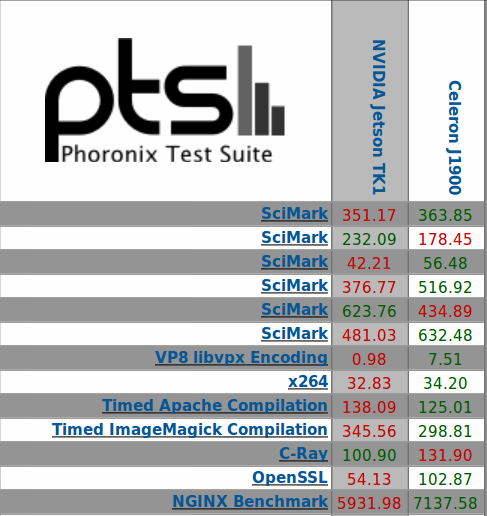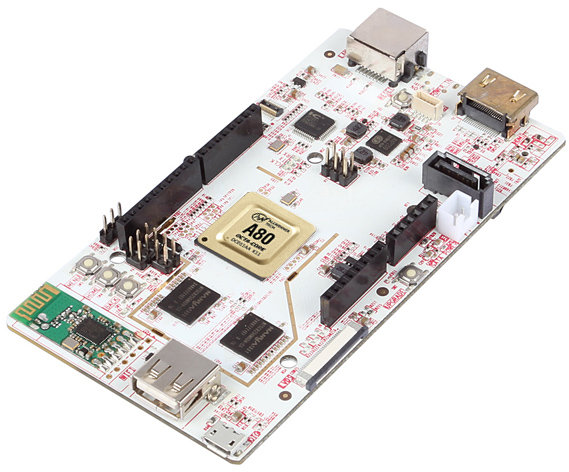A few days ago, in a post listing different system-on-module (SoM) standards, I mentioned COM Express standard was targeting SoMs based on x86 processors, and SMARC was the equivalent for ARM. I still understand it’s the case as COM Express standard defines mechanical dimensions that are usually larger than SoM standard for low power processors, some buses found in ARM and x86 are different (e.g. AFAIK LPC and PCI are not found in ARM SoC), and the standard supports high power signals which are not needed in ARM or MIPS processors. Having said that, I’ve been pointed out to two ARM based COM Express modules, which could make sense if you want to use an ARM based module using existing COM Express compatible baseboards. The COM Express modules below feature Freescale i.MX6 and Marvell Armada XP SoCs, and have been designed respectively by MEN Mikro Electronik and Pactron. MEN Mikro […]
AMD Announces ARM and x86 pin-to-pin Compatible APUs and SoCs for 2015, ARM K12 Core for 2016 and Beyond
AMD has designed x86 processor since its inception, and recently they’ve announced ARM Cortex A57 “Seatlle” SoCs targeting servers would be available later this year. They’ve now decided to merge their product line-up even further with Project Skybridge that aims to provide pin-to-pin compatible ARM and x86 SoCs and APUs by 2015, manufactured using a 20nm process. That means AMD’s customers should be able to leverage AMD’s “ambidextrous computing” solutions to design one and only board for x86 and ARM processors for server, embedded, semi-custom and ultra-low power applications. Processors of the “Project Skybridge” family will also be the first ARM based AMD processors to include a GPU (Graphics Core Next GPU), contrary to Seatlle SoCs, which are destined to be used for the server market, and do not come with a GPU. ARM processor will be based on low power ARM Cortex A57 cores and x86 processors will make […]
Olimex Introduces Low Cost AllWinner A13, AllWinner A20 and TI Sitara AM3352 Systems-on-Module
About a year ago, Olimex reported working on an AllWinner A20 System-on-Module. But after some unexpected delays, Olimex A20-SOM is finally available, and they’ve even announced A13-SOM and AM3352-SOM, respectively based on AllWinner A13 and Texas Instruments Sitara AM3352 ARM Cortex A8 SoCs, with price starting at 12 Euros for 1K orders. Olimex A20-SOM and A20-SOM-4G There are actuall two versions of the SoM, A20-SOM-4G including 4GB NAND flash, and A20-SOM without. Here are the specifications: SoC – AllWinner A20 dual core ARM Cortex A7 processor with Mali-400MP2 GPU System Memory – 1GB DDR3 memory Storage – 4GB NAND Flash (A20-SOM-4G only) + microSD slot Debugging – UART console connector (at the back) PMIC – AllWinner AXP209 PMU IC Misc – Status LEDs, RESET, RECOVERY buttons Connectors – 6x 2×20 pin 0.05″ female headers Dimensions – N/A The SoM is said to support Android and Debian, but you could also […]
A Quick Test Drive of Tails, a Privacy Focused Linux Distribution
Tails (The Amnesic Incognito Live System) is a Linux distribution that allows you to use the Internet anonymously and circumvent censorship via the Tor network. It leaves no trace, and is said to use “state-of-the-art” cryptographic tools to encrypt files, emails and instant messages. It’s distributed as a live image that boots from a DVD drive, a USB stick, or an SD card. Tails v1.0 has recently been released. so let’s give it a quick try. Tails is currently only available for x86 (32-bit), no ARM image yet. The source code is available via a git repo. Let’s download the ISO image (mirror), and signature. Alternatively you can download both via BitTorrent. To make sure the image is not compromised it’s recommend to verify the integrity of the ISO image with the signature we’ve just downloaded. You’ll also need a signing key The are several methods, but I’ve opened a terminal, […]
VIA Embedded Store Launches for Embedded ARM & x86 Boards and Systems
Most of the time for boards and systems targeting industrial or embedded applications, companies will not provide pricing information, and if you want a sample for evaluation, or want to order a few for a project requiring limited quantities, you’ll need to contact sales, talk about your project, volume, schedule, etc… But for VIA Embedded boards and systems, you won’t need to go through this loop anymore, as the company has just launched VIA Embedded Store where you can buy boards such as VAB-820 pico-ITX board or a rugged system such as AMOS-820 directly online without questions asked. I’ve gone through most of the checkout procedure and you can proceed as a guest or by registering, and they’ll just ask billing and shipping information, shipping method, and payment method selection (Only Paypal at this time). It’s a simple as that, no need to fill some “I’m not a terrorist” forms […]
XBMC 13 “Gotham” Released
After month of development, alpha releases, beta releases, RC releases, XBMC 13 “Gotham” is finally out. This is the first official release that supports hardware video decoding for ARM and x86 based Android 4.0+ devices. Support is not available for 100% of devices, as for instance, AllWinner A1X/A20 and Amlogic SoCs do not support the standard Android StrageFright or MediaCodec APIs, but most others should. There’s one XBMC Android version for ARM, one for x86. Android hardware video decoding is obviously not the only feature or improvement brought about by XBMC 13. Here are the key ones: Raspberry Pi and Android speed improvements – Overall system performance improvements, but optimizations are said to be particularly noticeable when opening and browsing libraries, loading images and starting videos. Stereoscopic 3D Rendering – SBS, TAB, anaglyph, and interlaced are supported. XBMC cannot yet support 3D blurays and cannot provide hardware acceleration for FullSBS/TAB […]
Nvidia Tegra K1 CPU/FPU Performance is Comparable to Intel Celeron “Bay Trail-D” J1900 SoC
Nvidia Jetson TK1 development board powered by Nvidia Tegra K1 quad core ARM Cortex A15 processor and a 192-core Kepler GPU has started shipping, and some people have already received theirs, including Michael Larabel (Phoronix) who ran some benchmarks on the board that comes pre-loaded with Ubuntu 14.04 LTS. We already had some benchmarks comparing Tegra K1 to ARM peers on Android, but it’s the first time Linux benchmarks are available. The benchmarks seems to only involve CPU and FPU, and probably not the GPU at this point, but the results are still interesting, and Michael also pointed links comparing Nvidia Tegra K1 development board performance to some Intel Core i5 based PCs, as well as a platform based on an Intel Celeron J1900, a quad core processor part of Bay Trail Desktop family. The later is most interesting as we compare systems with similar power requirements. Nvidia Tegra K1 […]
PcDuino8 Board Will be Powered by AllWinner A80 SoC
Many have been waiting for A80 OptimusBoard development board powered by AllWinner A80 octa-core big.LITTLE SoC to come to market. It could be another board will be targeting the DIY crowd, as LinkSprite and AllWinner have announced a strategic partnership to work on PcDuino8 board also based on the upcoming eight core SoC. The board picture above appears to be exactly the same as PcDuino3 with AllWinner A20, except they’ve replaced it with A80. This is really odd by itself, and since AllWinner A80 does not support SATA, an extra USB to SATA IC would be required. The lack of USB3 port is also surprising. So I’m assuming the board above is simply a photo edited in Photoshop. We could then further assume the board is not ready, and they are simply waiting for the PCB, which will they debug in May, before shipping the board by the end of […]


